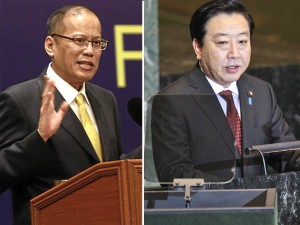Senators cite ups and downs of Philippines-Japan security pact

President Benigno Aquino III and Japanese Prime Minister Yoshihiko Noda. PHILIPPINE DAILY INQUIRER/AP FILE PHOTO
A security pact forged between the Philippines and Japan can be used as leverage in discussions with China and other claimants to the Spratly islands.
Some senators, however, warned the development could antagonize China, while countering that any indication of outside support for the Philippines could only be an advantage.
“The more allies we have when we finally face China, the better,” said Senate defense committee vice chairman Gregorio Honasan. “China would realize that many of us are affected by the issue.”
While Japan is not among the claimants to the Spratlys chain, which is believed to lie over rich gas and oil deposits, much of its commercial shipping passes through the West Philippine Sea (South China Sea) where the islands are located.
Other senators were not as optimistic about partnering with Japan on the issue, but still agreed that cooperation with the Japanese would be beneficial at this point.
“Any bilateral agreement with another country with influence in the Asia Pacific region could only be beneficial to us,” said Senate defense chairman Panfilo Lacson.
But antagonizing China may be a possible downside, he added.
Still, a partnership would be favorable “since the balance of power factor will come into play,” Lacson said.
Senate President Juan Ponce Enrile said China should not view a security partnership with Japan with antagonism.
“It’s simply a reality of life with the Philippines and Japan having been both under the US sphere of power. In terms of doctrines and tactics, I think we will benefit from it,” he said.
Senator Antonio Trillanes IV, on the other hand, believes the security cooperation “will only benefit us as far as posturing is concerned.”
“The more people backing us up, the better for us. But is it a game changer? I don’t think so because China would still maintain her position and (she) won’t give up (her) claim just because Japan is on board. I don’t think that’s going to happen. We (would) still have the status quo,” he said.
In Washington, DC, where he is on a visit, former Philippine President Fidel Ramos said Wednesday that China’s recent assertiveness in the West Philippine Sea was motivated by a desire to challenge America’s power, as he predicted more tensions to come.
Agence France-Presse reported Ramos describing the United States and China as “shadow boxing” over the West Philippine Sea (South China Sea) and East China Sea where Beijing has created a growing friction with countries including the Philippines, Vietnam and Japan.
“China’s proximate aim, it seems to me, is to limit American freedom of access” and “erode the credibility of Washington’s security guarantees to the East Asian states, including and especially the Philippines,” said Ramos, who was president from 1992 to 1998, speaking at the Heritage Foundation.
“We, where we come from, expect South China Sea tensions to continue because the root cause is really China’s perceived need to break out from under the strategic dominance of the Western allies,” he said. With an AFP report
For comprehensive coverage, in-depth analysis, visit our special page for West Philippine Sea updates. Stay informed with articles, videos, and expert opinions.